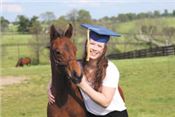|
UK Equine Undergraduate Program Awarded Employability Certification

Hannah Moriarity graduated from UK in May with a degree in equine science and management.
Photo by Catherine Primavera.
LEXINGTON, KY.
The University of Kentucky’s equine science and management undergraduate degree program was recently awarded an Essential Employability Qualities (EEQs) certification by the QA Commons, a national nonprofit organization focused on preparing college students for the challenges they will face in the workforce.
UK’s equine program is one of only 13 programs certified nationally, and the only equine-focused one. Programs are EEQ certified through a comprehensive and integrated framework of criteria that includes graduate preparation; career services integration; employer engagement; student and alumni engagement; and public display of career information. The eight identified Essential Employability Qualities are communication, thinking and problem solving, inquiry, collaboration, adaptability, principles and ethics, responsibility and professionalism and learning.
“The UK College of Agriculture, Food and Environment is committed to preparing our students for the 21st century workforce. We are very proud of the equine science and management program for earning an Essential Employability Qualities Certification. This certification is a strong signal to employers that students who graduate from this program are prepared with the skills necessary to succeed in the equine industry,” said Carmen Agouridis, associate dean for instruction.
The undergraduate degree program is one of three pillars of equine excellence in the college. Education, research and extension/outreach are the hallmarks of a land-grant institution, and equine programming at UK checks each of those boxes with robust offerings.
The equine science and management program is also one of only three standalone four-year equine undergraduate programs in the U.S. connected to a land-grant university. All students in the major are required to take courses that provide a strong background in equine science, management and business. Additionally, they can customize their education in at least one of the three emphasis areas: equine science, equine management and business, and communications and leadership.
“Employability skills are essential to being prepared for both initial and long-term professional success,” said James MacLeod, UK Ag Equine Programs director and faculty member in the Gluck Equine Research Center. “In our curriculum, we absolutely value a strong foundation of knowledge in equine science and core subjects. Importantly, however, we concurrently strive to help students develop essential employability skills that will enable them to reach career goals and achieve their full potential.”
Students in the program have many opportunities for career and industry growth outside the classroom via academic enrichment in internships or study abroad, leadership via the program’s student ambassador program – Wildcat Wranglers – or participation in one of nine equine clubs and teams.
“The Essential Employability Qualities program certification program is a great way to solidify the measures we have taken to ensure that our students are ready for careers within the equine industry,” said Kristen Wilson, academic coordinator in the equine science and management program. “Preparing students in both the equine content and skills, as well as employability skills, is essential to have them succeed as professionals in the industry.”
Students have multiple opportunities to apply learning in work-relevant contexts. The required 150-hour internship, as well as internships students complete outside of curricular requirements, prepare students for work in the equine industry. In addition to internships, there are numerous other interactions with employers, such as the job-shadowing assignment, attending industry events and hosting guest speakers. Career development begins with a strengths assessment during the freshman year and progresses through a path to professionalism outlined by the program for the subsequent years.
“Our program is on the front lines of integrating high quality career development for our students. We want our students, alumni, university partners and our industry to know the ways we’re helping our students grow in these key areas,” said Savannah Robin, the program’s internship coordinator. “We are excited to highlight the innovative efforts of our faculty and staff and the exceptional attributes of our students.” ∆
|
|